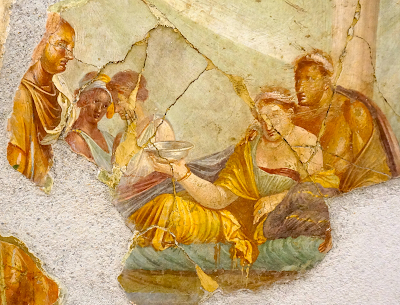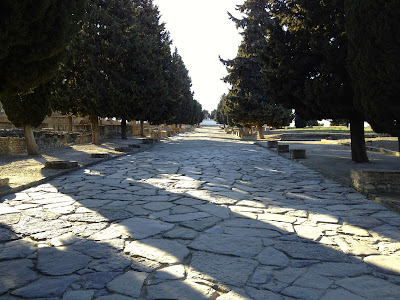Reading Martial's poems one inevitably gets the impression of a cynical poet who writes satirical poems about the vices and social injustices he sees around himself. Most of his production does belong to this genre. Lately, however, I've come to notice and appreciate Martial's positive descriptions of life, which stand out even more when they are placed among all the insults and satire. Martial was a master of variation and juxtaposition. His poems on the good and happy life convey a philosophy of life that is simple and down-to-earth, and which he himself followed in his life – at least to a certain extent.
 |
Cyclamen at Hadrian's Villa in Tivoli
|
One piece of advice that Martial offers is to live in the moment. The same idea was coined by Horace in the phrase carpe diem. Martial manages to form even this theme into a satirical poem that is addressed to one Postumus. His name was chosen to fit the theme, as it means late-born or one who has been born after his fathers death.
You say you will live tomorrow, Postumus, always tomorrow.
Tell me, that tomorrow, Postumus, when is it coming?
How far off is that tomorrow, where is it, or where will you go to get it?
Is it hiding in Parthia or Armenia?
That tomorrow of yours is already as old as Priam or Nestor.
How much, tell me, would that tomorrow cost to buy?
Will you live tomorrow? It’s already overlate, Postumus, to live today.
He is wise, Postumus, who lived yesterday.
(Mart. 5.58)
Worrying about tomorrow sounds familiar. I usually manage to fill my calendar for many weeks ahead and constantly think about things I need to take care of. When do I learn to stop and enjoy the moment a bit more?
 |
| A detail of a fresco from Pompeii |
Perhaps the most well-known of Martial's descriptions of the happy life is the one he sent ot his friend Julius Martialis:
Most delightful Martialis,
the elements of a happy life are as follows:
money not worked for but inherited;
land not unproductive; a fire all the year round;
lawsuits never, a gown rarely worn, a mind at peace;
a gentleman’s strength, a healthy body;
guilelessness not naive, friends of like degree,
easy company, a table without frills;
a night not drunken but free of cares;
a marriage bed not austere and yet modest;
sleep to make the dark hours short;
wish to be what you are, wish nothing better;
don’t fear your last day, nor yet pray for it.
(Mart. 10.47)
Martial's ideal life resembles the one prescribed by epicurean philosophy, where happiness is found through moderate pleasures and simple life. Riches and other excesses should be avoided. Towards the end of his life Martial withdrew from Rome to his hometown of Bilbilis in Spain, where he could live his last years according this ideal. This is how he described his days to his friend Juvenalis, who may be the well-known Roman satirist Juvenal:
While you perhaps, Juvenal,
wander restlessly in noisy Subura
or tread Lady Diana’s hill,
while your sweating gown fans you
as you cross the thresholds of the powerful
and the Greater and Lesser Caelian tire out the wanderer:
me my Bilbilis, proud of her gold and iron,
revisited after many Decembers,
has received and made a rustic.
Here in idleness I exert myself pleasantly
to visit Boterdus and Platea
(such are the uncouth names in Celtiberian lands).
I enjoy an enormous, indecent amount of sleep,
often unbroken till past the third hour,
and pay myself back in full now
for my vigils of thirty years.
The gown is unknown, but when I ask
I am handed the nearest garment to hand from a broken chair.
When I get up, a fireplace welcomes me
stocked with a proud pile of logs from an adjacent oak wood
and crowned by the bailiff’s wife with many a pot.
The huntsman comes next, but one that you
would like to have with you in a secret grove.
The smooth-skinned bailiff gives my boys their rations
and asks me to let him cut his long hair.
So fain would I live, so fain would I die.
(Mart. 12.18)
Martial no longer needed to wear the toga, which was used by Roman men while taking part in public affairs. Juvenalis, on the other hand, still had to suffer the noise and heat of Rome, while Martial could enjoy the peace and quiet of his country villa. I wouldn't mind some of this peace and quiet in the midst of all the research and other duties. At least summer is coming soon and with it holidays at our cottage or sailing in the archipelago.
 |
Street view of Italica near Seville
|
Life in Spain, however, wasn't all to Martial's liking. This simple life lacked the civilized atmosphere that he was used to in Rome, and the audience to whom he had written his poems. This is how Martial explains to his friend Priscus why he hasn't published more poems during his stay in Spain:
The first and most important point is that I miss the ears of the community to which I had grown accustomed. It is like pleading a case in a strange court. For if there is anything to please in my little books, the audience dictated it. The subtlety of judgments, the inspiration of the themes, the libraries, the theaters, the gatherings where pleasure is a student without realizing it, to sum it all up, all those things which in my fastidiousness I forsook, 1 now regret as though they had deserted me. (Mart. 12, preface)
Martial missed the inspiration provided by the city of Rome and the literary circles there, even though he enjoyed the quiet of the countryside. All the aspects of a happy life were not attainable for him at the same time.
I sometimes wish that I could avoid all the tedious duties and just concentrate on more enjoyable things such as friends, pastimes and other simple joys of life. The pressures of work and academic performance are often stressful. On the other hand, I can't imagine my life without intellectual pursuits such as studying new things or doing research. Still, it's good that Martial's poems remind me that work and duties should be balanced with other things in life.
Translations of Martial's poems: D. R. Shackleton Bailey Martial: Epigrams, Loeb Classical Library, Harvard University Press, 1993.
Photos: Joonas Vanhala




No comments:
Post a Comment